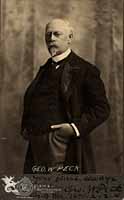

 |
 |


Mr. Peck was born in New York in 1840, but he lived in Wisconsin from 1843 until his death, April 16, 1916. He was connected with newspapers at Whitewater, Jefferson, La Crosse, and Milwaukee. He founded the "Sun" at La Crosse in 1874, and later removed it to Milwaukee, where he called it "Peck's Sun." At one time he was unquestionably the best-known writer in Wisconsin, and the best-known Wisconsin writer throughout the country, which fame came to him through his "Peck's Bad Boy" sketches. He was also the author of "Peck's Compendium of Fun," "Peck's Sunshine," together with almost countless sketches which usually were in some way connected with the mischief-loving, mirth-provoking "Bad Boy." Neighbors of the Pecks in Whitewater tend, by their recollection of the former Governor, to confirm the suspicion that not all of "Peck's Bad Boy" was fiction, and that the author himself may have played a not inconsiderable part in the scenes therein depicted.
Mr. Peck's fellow-citizens in Milwaukee honored him with the mayoralty, and the citizens of the state made him Governor from 1891 to 1895. He had a keen memory for his old friends; and citizens, both young and old, who could remind him of some of his old neighbors in Whitewater or Jefferson were always sure of a pleasant chat with him.
A man came into the "Sun" office on Tuesday with a black eye, a strip of court plaster across his cheek, one arm in a sling, and as he leaned on a crutch and wiped the perspiration away from around a lump on his forehead, with a red cotton handkerchief, he asked if the editor was in. We noticed that there was quite a healthy smell of stock-yards about the visitor, but thinking that in his crippled condition we could probably whip him, if worst came to worst, we admitted that we were in. "Well, I want to stop my paper," said he, as he sat down on one edge of a chair, as though it might hurt. "Scratch my name right off. You are responsible for my condition."
Thinking the man might have been taking our advice to deaf men, to always walk on a railroad track if they could find one, wewere preparing to scratch him off without any argument, believing that he was a man who knew when he had enough, when he spoke up as follows:
"The amount of it is this. I live out in Jefferson county, and I come in on the new Northwestern road, just to get recreation. I am a farmer, and keep cows. I recently read an article in your paper about a dairymen's convention, where one of the mottoes over the door was, 'Treat your cow as you would a lady,' and the article said it was contended by our best dairymen that a cow, treated in a polite, gentlemanly manner, as though she was a companion, would give twice as much milk. The plan seemed feasible to me. I had been a hard man with stock, and thought maybe that was one reason my cows always dried up when butter was forty cents a pound, and gave plenty of milk when butter was only worth fifteen cents a pound. I decided to adopt your plan, and treat a cow as I would a lady. I had a brindle cow that never had been very much mashed on me, and I decided to commence on her, and the next morning after I read your devilish paper, I put on my Sunday suit and a white plug hat that I bought the year Greeley ran for President, and went to the barn to milk. I noticed the old cow seemed to be bashful and frightened, but taking off my hat and bowing politely, I said, 'Madame, excuse the seeming impropriety of the request, but will you do me the favor to hoist?' At the same time I tapped her gently on the flank with my plug hat, and putting the tin pail on the floor under her, I sat down on the milking stool."
"Did she hoist?" said we, rather anxious to know how the advice of President Smith, of Sheboygan, the great dairyman, had worked.
"Did she hoist? Well, look at me, and see if you think she hoisted. Say, I tell you now in confidence, and I don't want it repeated, but that cow raised right up and kicked me with all four feet, switched me with her tail, and hooked me with both horns, all at once; and when I got up out of the bedding in the stall, and dug my hat out of the manger, and the milking-stool out from under me, and began to maul that cow, I forgot all about the proper treatment of horned cattle. Why, she fairly galloped over me, and I never want to read your old paper again."
We tried to explain to him that the advice did not apply to brindle cows at all, but he hobbled out, the maddest man that ever asked a cow to hoist in diplomatic language.